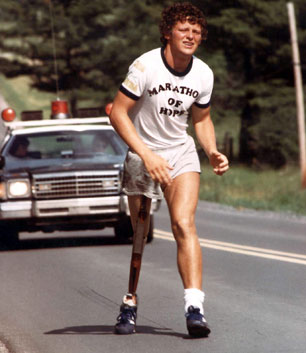FOOTNOTESJune 17th, 2011
Betty Fox, Terry Fox’s mother, dies
Terry Fox's Marathon of Hope began in July of 1980. It was a privilege to be a part of that first Terry Fox Run some 31 years ago and to still have the health and ability to run today. Terry Fox, in his many monumental marathon efforts and legacy of determination simply puts all of our attempts at running marathons, or just running for that matter, into the proper perspective. Have you ever stopped long enough and given thought to or thanks for your health, the ability to run and the gift of another new day? The running rev.
VANCOUVER — Betty Fox, the mother of one of Canada’s most beloved heroes, who nurtured Terry Fox’s legacy into one of international .action and inspiration in the fight against cancer, has died.
Her family said at the beginning of June that Fox was seriously ill and in a hospice, though their statement said reports she was suffering from cancer were incorrect.
On Friday morning, the family posted a notice on the Terry Fox Foundation website saying she had died a few hours earlier.
“Betty/Mom passed away peacefully surrounded by love,” the family said.
“Betty was comfortable in the last few weeks and months of her life, was always full of wit and rarely alone. Betty is now with Terry and joins other dear family members that predeceased her.”
The family did not plan to speak further Friday.
For more than three decades, Betty Fox kept her son’s cancer-fighting legacy alive by organizing runs, raising funds and playing a role in the opening of a foundation and research institute.
“She has been such an incredible ambassador for the legacy that her son left behind and also an incredible ambassador for the work that Terry started for it to continue,” said Fred Tinck, Terry Fox’s high school running coach.
“I mean, when you think about the fact that Terry’s run was, you know, 30 years ago and that it’s still very much alive and literally tens of thousands, probably even hundreds of thousands of people who were not even born when Terry did his run are still running today in his legacy. I mean, that’s an incredible accomplishment.”
Terry Fox vowed to raise funds for cancer research by running across Canada in his 1980 Marathon of Hope.
He had been diagnosed at 18 with bone cancer. In 1977, doctors amputated his right leg 15 centimetres above the knee.
Overcome by the suffering he saw as he underwent treatment, especially the children suffering from cancer, Fox vowed to run across the country to raise money for research.
Initially, Betty said she was opposed to the plan, and the mother and son quarrelled.
“It was a stupid thing to want to do,” she recalled in a 2005 interview with Maclean’s magazine. “Really stupid.”
However, the two reconciled and on April 12, 1980, Terry began his Marathon of Hope by dipping his foot into the Atlantic Ocean in St. John’s, N.L.
In the coming months, Fox ran a full marathon, 42 kilometres, every day, despite the amputated leg, bad weather, illness and fatigue.
After 143 days and nearly 5,400 kilometres, Fox was told the cancer had returned, this time to his lungs, and he was forced to end his marathon outside of Thunder Bay, Ont.
He died June 28, 1981, at age 22.
In the months and years after Terry’s death, the Fox family, including Betty, carried on with his goal to raise funds for research.
On Sept. 13, 1981, months after Terry’s death, about 300,000 people participated in the first Terry Fox Run at more than 760 sites in Canada. The run raised $3.5 million.
In 1988, Betty and her other son, Darrell, set up the Terry Fox Foundation. It has raised more than $550 million for cancer research in 28 countries through annual Terry Fox Runs.
In 1994, the Terry Fox Hall of Fame opened in Toronto to recognize Canadians who have enhanced or assisted the lives of people living with physical disabilities.
In 2007, the Terry Fox Research Institute opened. It helps cancer hospitals and researchers collaborate.
Because of her efforts to continue Terry’s legacy, Betty Fox was chosen as one of the prominent Canadians who carried a flag into the stadium to light the cauldron and begin the 2010 Games.
In an interview last year, Fox admitted she sometimes gets worried interest is dwindling in the run.
“Sometimes you get those ridiculous thoughts in your head,” she said. “I get angry at myself ... I don’t know of anything that has lasted that long, that has been the same type of a fundraiser.
“Every year you worry about it happening, but sitting back and looking at the people who believe, the stories you hear from people who are living many years after being diagnosed with cancer, I believe it will be around for a number of years.”
The foundation website has several addresses where mourners can share their thoughts and condolences.
Terry Fox's Marathon of Hope began in July of 1980
: 

